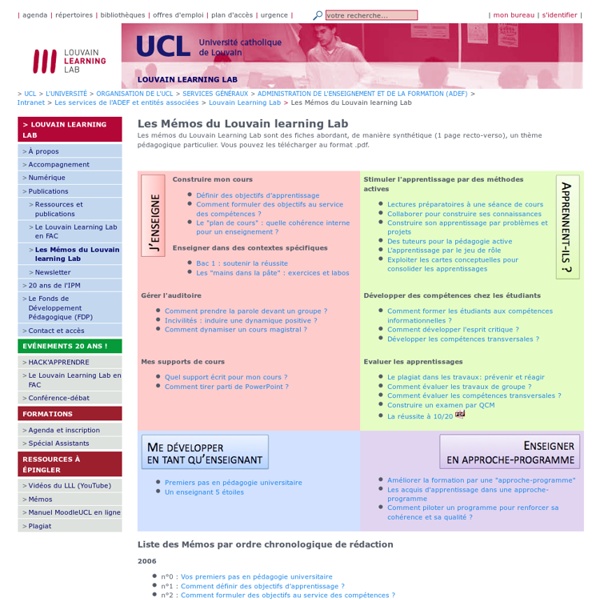



http://www.uclouvain.be/97784.html
Related: MOOC - UCL • Activités - apprendre (en ligne) • Scénarios : tutoral et pédagogique • prof_m_roigActivité 6.4 - Learning by Peer Review SWoRD. SWoRD is a web-based reciprocal peer review system. In less fancy terms, students turn their class papers into SWoRD, which then assigns this paper to four to six peers in the class. The peers grade the paper and give advice for how to improve it. Alternatives To Homework: A Chart For Teachers Alternatives To Homework: A Chart For Teachers Part of rethinking learning means rethinking the bits and pieces of the learning process–teaching strategies, writing pieces, etc. Which is what makes the following chart from Kathleen Cushman’s Fires in the Mind compelling. Rather than simply a list of alternatives to homework, it instead contextualizes the need for work at home (or, “homework”). It does this by taking typical classroom situations–the introduction of new material, demonstrating a procedure, etc.), and offering alternatives to traditional homework assignments. In fact, most of them are alternatives to homework altogether, including group brainstorming, modeling/think-alouds, or even the iconic pop-quiz.
Cerveau et Apprenance Upload Code Formation le blog Subscription preferences E-Learning Development Tools The ADDIE Model for E-Learning Instructional Design There are different schools of thought on how best to design courses, whether mobile, online or otherwise. One very useful model for design – also known as instructional design – is represented by the acronym ADDIE. It is a design process model that is made up of five distinct parts: Analysis, Design, Development, Implementation and Evaluation. This post will look at each part in turn and describe how they can be applied in the development of an e-Learning based course. Activité 6.4 - Using Peer Review to Help Students Improve Writing Instructors teaching a writing-intensive course, or any course that requires students to produce a substantial amount of writing, should consider creating opportunities for students to read and respond to one another's writing. Such opportunities to engage in "peer review," when well planned, can help students improve their reading and writing skills, and learn how to collaborate effectively. More specifically, participating in peer review can help students
10 Team-Building Games That Promote Collaborative Critical Thinking One of education’s primary goals is to groom the next generation of little humans to succeed in the “real world.” Yes, there are mounds of curricula they must master in a wide breadth of subjects, but education does not begin and end with a textbook or test. Other skills must be honed, too, not the least of which is how to get along with their peers and work well with others. This is not something that can be cultivated through rote memorization or with strategically placed posters.
People remember 10%, 20%...Oh Really? Publication Note This article was originally published on the Work-Learning Research website (www.work-learning.com) in 2002. It may have had some minor changes since then. Attribution 4.0 International — CC BY 4.0 Creative Commons Corporation (“Creative Commons”) is not a law firm and does not provide legal services or legal advice. Distribution of Creative Commons public licenses does not create a lawyer-client or other relationship. Creative Commons makes its licenses and related information available on an “as-is” basis. Creative Commons gives no warranties regarding its licenses, any material licensed under their terms and conditions, or any related information. Creative Commons disclaims all liability for damages resulting from their use to the fullest extent possible.